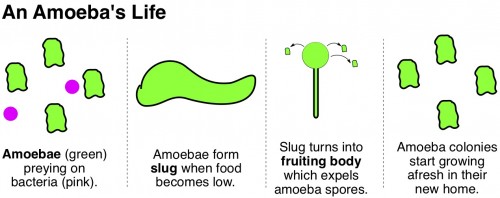 A new study reveals that even amoebaethis is the plural of amoeba, as if the word needed more vowels – those squishy little single-celled organisms – know how to save up for a rainy day. Scientists at Rice University have discovered that some members of a certain amoeba speciesDictyostelium discoideum like to save up food for when times get tough.
A new study reveals that even amoebaethis is the plural of amoeba, as if the word needed more vowels – those squishy little single-celled organisms – know how to save up for a rainy day. Scientists at Rice University have discovered that some members of a certain amoeba speciesDictyostelium discoideum like to save up food for when times get tough.
The amoebae in this study are social amoebae, which means that the individual single-celled organisms occasionally join forces in times of need. When food supplies become scarce, the amoebae squeeze together to make a multicellular organism (a slug) that can travel to a new location and set up new amoeba colonies.

The researchers discovered that some of the amoeba slugs (technically, the fruiting bodies – the stage right after slug) contained bacteria. And not just any bacteria – these amoeba conglomerates held the particular type of bacteria that the amoebae liked to eat. This seemed like an awful big coincidence, so the scientists did a little testing.
They looked at two kinds of fruiting bodies – ones that contained bacteria and ones that didn’t. The researchers allowed each type to expel amoeba spores, which then grew into new amoeba colonies. Eventually these second-generation colonies made their own slugs and fruiting bodies, and the scientists examined these carefully. It turned out that the second-generation conglomerates contained bacteria only if their ancestor fruiting body did. This indicated that the bacteria weren’t being randomly picked up from nowhere – some of the amoeba colonies knew how to hoard bacteria and others didn’t.
 Just like people, some amoebae are savers and others are spenders. The savers stop eating bacteria when the supply begins to dwindle, and stow away the rest until they’ve reached a new location with better soil for growing bacteria. At the new location, the responsible amoebae “plant” their saved bacteria and start harvesting bacteria crops again.
Just like people, some amoebae are savers and others are spenders. The savers stop eating bacteria when the supply begins to dwindle, and stow away the rest until they’ve reached a new location with better soil for growing bacteria. At the new location, the responsible amoebae “plant” their saved bacteria and start harvesting bacteria crops again.
On the other hand, the spender amoebae don’t know how to budget. They just eat and eat until all their bacteria are gone. They then band together to move to a new location, crossing their amoeba fingers that there will be more bacteria there.
Which is the better approach – saving or spending? The fact that both saver and spender amoeba colonies exist indicates that both approaches are viable. Conversely, both approaches have trade-offs. The amoebae that quit eating early to save food for later will have less energy than the amoebae that eat everything in sight. If the amoebae’s new home turns out to have plenty of bacteria anyway, then the saver amoebae skimped on food for nothing. This is akin to a human dutifully building up a savings account, only to then win the lottery.
But it’s a gamble. If the amoebae’s new home turns out to be barren, then the fiscally irresponsible amoebae will be off to a slow start without food reserves. This is like a human losing his job and not having a financial cushion to carry him through a period of unemployment.
Citation:
Brock, D., Douglas, T., Queller, D., & Strassmann, J. (2011). Primitive agriculture in a social amoeba Nature, 469 (7330), 393-396 DOI: 10.1038/nature09668


Bora Tweet!
Sharon, the current savings rate of Americans is 5.9% or so. Does the article (no access right now) say anything about what an equivalent rate might be?
Well, the article actually goes with a farmer analogy rather than savers/spenders. But equating farmers = savers, the following quote may answer your question:
“Non-farmers eat all the bacteria whereas farmers leave many bacteria unconsumed, roughly half the number present as compared with bacteria grown alone.”
So… 50% savings rate??
Aw an adorable poem was written by Elissa Malcohn about these amoebas; it starts:
Bacteria saved are bacteria earned.
Thus is Ben Franklin’s wisdom turned
By social amoebas banding together…
Go here to read it in full! http://hurricanecountry.blogspot.com/2011/01/science-poems-for-january-2011-23.html